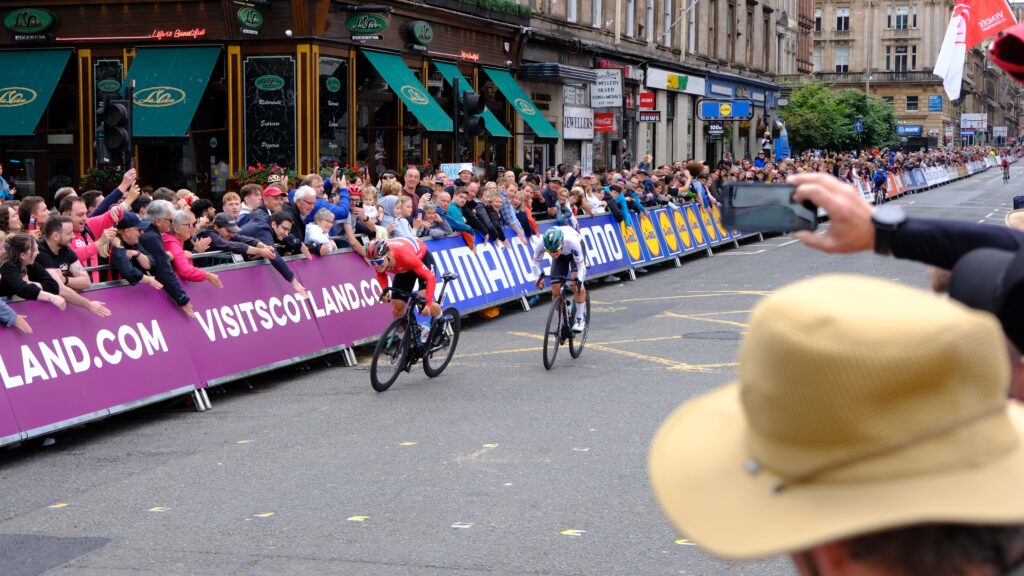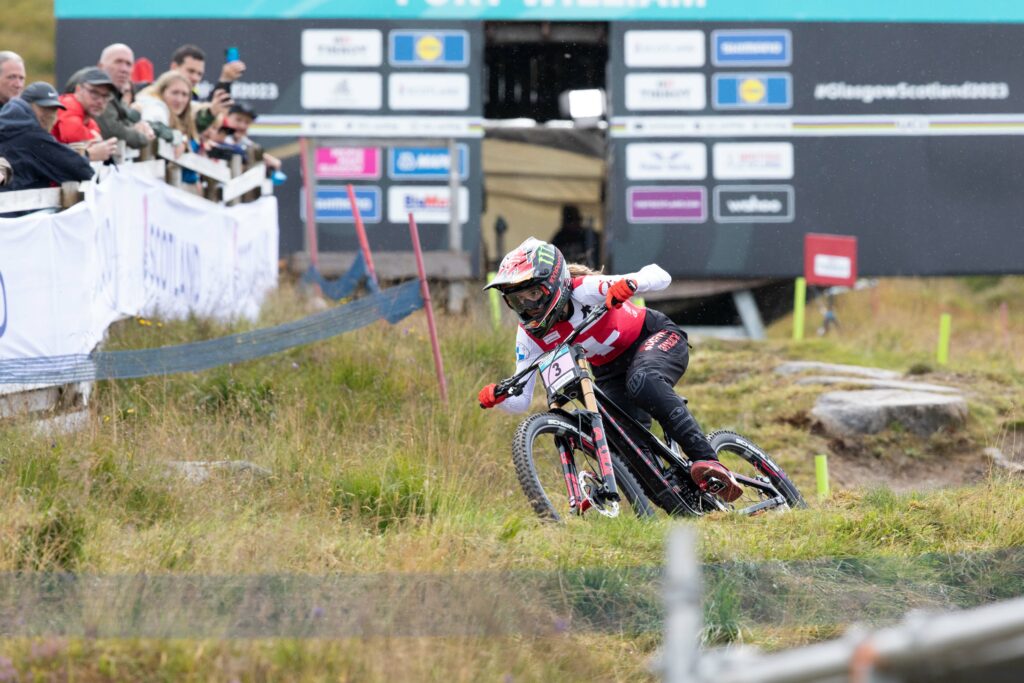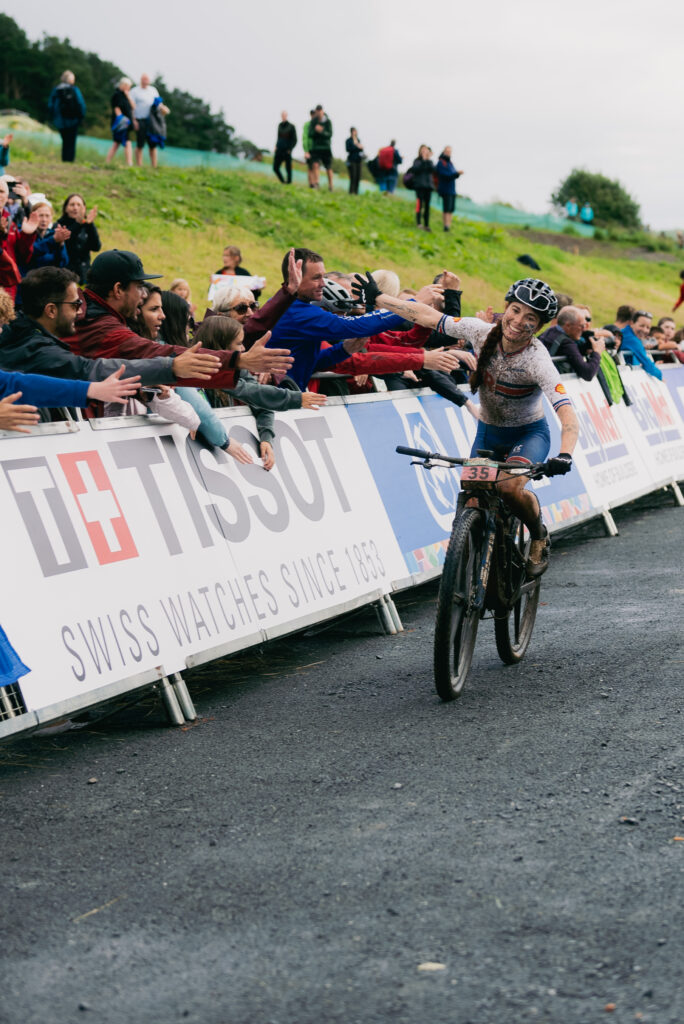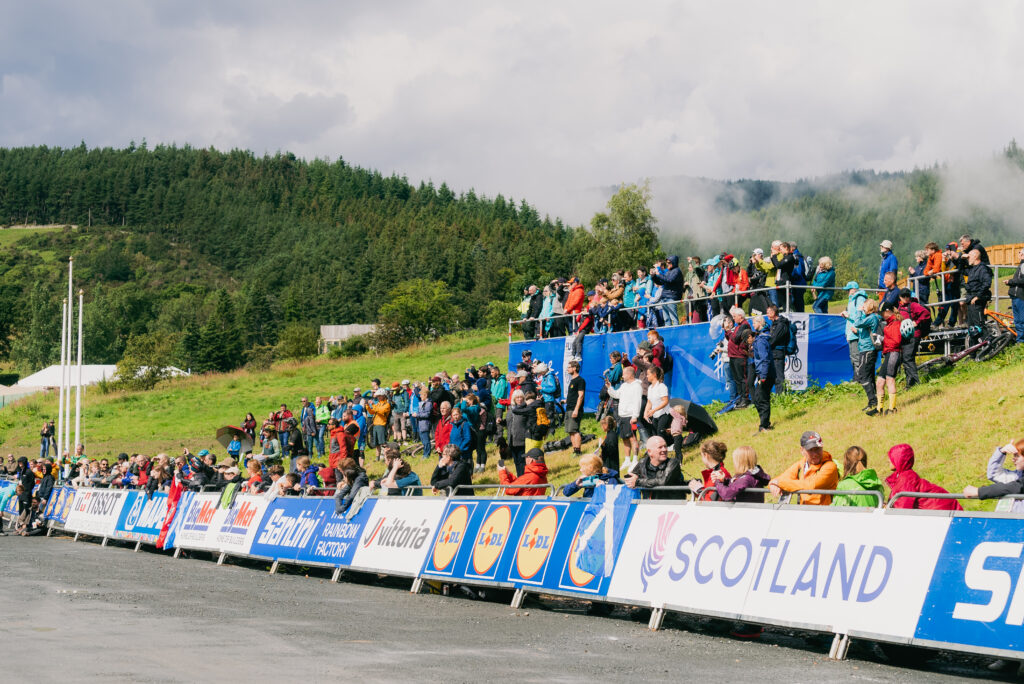Aneela McKenna, equality, diversity and inclusion (EDI) adviser of the 2023 Cycling World Championships in Glasgow, walks us through the event’s EDI Framework and Pledge, and why EDI is part of the Championships’ Sustainability Framework.
In a 2020 YouGov poll, 56% of Britons were not aware of the UN Sustainable Development Goals (SDGs), 26% were aware of the goals but didn’t know much about them, while only 6% claimed to be fully aware of them.
If you asked a friend or neighbour to define sustainability, they’d probably relate the term to the environment, rather than the social or economic connotations of the word and how all three categorisation’s interrelate.
Yet, the Union Cycliste Internationale (UCI) and organisers of Glasgow 2023, the first ever cycling ‘Super World’s’ that brought together 13 different World Championships disciplines to create the largest cycling event ever between 3rd-13th August, ensured sustainability at the event went beyond solely the environment by mapping the SDGs to a broad spectrum of environmental, social and economic KPI’s.
Along with Glasgow 2023’s wider Sustainability Framework, this SDG mapping will be explored in an upcoming article on The Sustainability Report, but an aspect of the Framework we will be focusing on here is Glasgow 2023 organisers’ acknowledgement that ‘climate change will have serious effects on people that are most vulnerable in society, who are living in poverty, and lack economic opportunity, widening the inequality gap even further.’
This drive to reduce inequality is just one reason why the event’s EDI Framework is integrated into the Sustainability Framework.
Aneela McKenna, EDI advisor of Glasgow 2023, was instrumental in that decision.
“What frustrates me with sustainability is that is that we talk about the environment, but kind of forget about the people aspect sometimes,” she says, “and I feel very fortunate that has actually come together for this project. EDI wasn’t really considered as part of sustainability when I joined.”
Also the founder of Mòr Diversity and a professional mountain bike guide and coach, McKenna won the tender process to be Glasgow 2023’s EDI advisor in 2022, just over a year before the World Championships began. Her passion to integrate EDI into sustainability, plan to use the event to inspire new audiences to ride bikes, and integrating the event’s EDI policies into the Scottish government’s existing EDI priorities that led to McKenna coming out on top.
McKenna argues that EDI won’t happen in organisations are not intentional about it, which is a problem in cycling where many organisations may lack diversity: “If you don’t have organisations that are diverse, they’re not going to think in a way to challenge their own assumptions and biases.”
The EDI Framework developed from an EDI steering group established in 2022, shortly after McKenna joined as an adviser. “We’ve had a year to work on developing the strategy and getting the partners on board in terms of what exactly the issues are, defining what that framework looks like, and pulling together an equality impact assessment,” McKenna explains.

In collaboration with Scottish Cycling, Glasgow 2023 organisers provided opportunities for over 1,400 children to Ride The Worlds, including U12, U14 and U16 ‘Race The Worlds’ events at World Championships venues.
Before Glasgow 2023, predominantly men and boys would engage with such initiatives. Research shows that women and girls can face barriers to cycling because of poverty, social and cultural norms, poor infrastructure and health inequalities.
Scottish Cycling, therefore, aimed to include as many women and girls as possible in Ride The Worlds. At ‘Experience The Worlds’ events, there was an almost 50% gender split (M:F 56:44) with over 150 girls participating, including a girls only event at The Loading Bay in Glasgow with 70 participants.

Of Glasgow 2023’s 195 elite and amateur competitions, 97 were male events, 90 female and 8 mixed gender. Numerous decisions were taken to empower women’s cycling, such as making free period products available at all venues and the women’s elite road race being the final race of the Championships. Some people associated with men’s road cycling were disgruntled by this, showing why such scheduling is important to normalise.
“Making that [women’s elite road race] the grand finale hopefully encourages people to recognise that actually, they can get just as much from it than the men’s,” McKenna urges, her mission helped no less by the brilliance of Belgium’s Lotte Kopecky solo win. McKenna hopes that a media boost for women’s cycling in the same vein as women’s football can ensure the sport receives the support it needs to continue growing.
Glasgow 2023’s scheduling also empowered para-events, interspersing para-competition with able-bodied events in Sir Chris Hoy Velodrome. McKenna becomes emotional as she describes how “lucky” she was to give 3x winner for Great Britan at Glasgow 2023 Jaco van Gass a prize on the podium.
Before Glasgow 2023, para-cyclists have never had the choice whether they wanted to put on the rainbow jersey, worn by the reigning world champion in a cycling discipline, while stood on the podium. They were empowered with this choice in Glasgow, which McKenna is certain made a big difference to para-athletes’ experience.

My experience of Glasgow 2023 included being struck by the diversity of volunteers compared to other sports events I’ve attended, with people of all ethnicities and disabilities at every venue.
McKenna explains that representatives from prospective volunteer teams complemented an internal steering group to shape recruitment objectives and KPI’s, leading to certain community groups being invited to participate in the World Championships. In the second round of volunteering recruitment, the steering group and volunteer team representatives used Scottish population figures as a benchmark to understand who wasn’t coming forward to volunteer.
A diverse range of athletes and community champions across Glasgow 2023 used cycling to celebrate this diversity. For instance, a local athlete who is deaf had two children in the mountain bike cross country event, so organisers included a BSL interpreter for prize-giving and invited the Scottish Deaf Cycling Club to attend.

Because the UCI and Glasgow 2023 organisers wanted EDI to be part of their ‘DNA’, all partners and stakeholders were asked to sign the #RideTogether Pledge.
“We created accessibility guidelines called ‘Planning For Inclusion’,” explains McKenna. Organisers worked with Euan’s Guide, a website providing a platform for people with disabilities to rate the accessibility of places they visit, as well as ‘Event Delivery Champions’, nominated by every Event Delivery Partner.
“We opened their eyes to the experience of others that are not necessarily like themselves,” McKenna describes, “getting people to step out of their comfort zone to realise that actually people’s needs are different.”
Prior to Glasgow 2023, a community forum of groups representing ethnic minority communities, disabled people, mental health and women’s organisations launched to provide organisers with feedback that ensured venue communications were inclusive. Accessibility and inclusion audits were then conducted by disabled experts and local users at most venues.
The result was composing 25 elements for each venue to implement, mostly communication related. McKenna gleams as she describes how each venue had its own easy-to-read spectator guide, rather than one overarching guide for Glasgow 2023 that lacked specificity.
McKenna believes Planning For Inclusion spurred partners to be creative in ways that enabled different audiences to engage in cycling’s various disciplines in ways they’d never previously had access to.
An example is at Glasgow Green where the BMX events were hosted. “The grass had these big rubber raised bumps where they had to cover cables for health and safety,” explains McKenna, “but they were challenging to get over for a wheelchair user.” The answer was a section of longer ramps that made going over the cables more gradual, which McKenna describes as a “simple solution that can make a massive difference” to the entire experience of the event for wheelchair users.

The #RideTogether Pledge was a mechanism to ensure Glasgow 2023’s partners take action on EDI, but as McKenna asserts, it was also to “recognise that they also have responsibility and accountability.” Some of the Pledge’s commitments have been more fruitful than others, but McKenna hopes they will be used as learning areas for future events.
Cycling’s ‘Super World’s’ will occur every four years, so recognising the key lessons from Glasgow 2023 are crucial for the UCI to begin working towards the next edition in 2027 at Haute-Savoie, where 13 disciplines will be expanded to 19 and the logistical challenge will only increase.
Much on the individual policy level can be carried forward, but Haute-Savoie 2027 organisers face a challenge to replicate the manner in which everyone from top to bottom involved in organising Glasgow 2023 worked in the same direction towards achieving EDI KPI’s. For instance, the Championships’ leadership team received EDI training, which was also included in the volunteer induction and inclusion training for Event Delivery Champions.
For McKenna, it reflects how everyone can learn from a place they are willing to be uncomfortable: “EDI is a tough gig, because it’s obviously everywhere, right? It’s a battle to get people to recognise that our organisations continue to stay the same in terms of demographics. They need to challenge themselves and way they do things.”
Whether it’s para-competition integration or avoiding period poverty, the UCI set an EDI precedent at Glasgow 2023 for the rest of the sports sector. Beyond enabling a new generation of people to make cycling part of their lives beyond the event, that is a substantial facet of Glasgow 2023’s legacy.
Stay tuned to The Sustainability Report for more Glasgow 2023 coverage in the coming weeks.
Opt into our weekly newsletter for exclusive content focused on sustainability strategy, communication and leadership for sport’s ecosystem.










Leave a Comment
Your email address will not be published. Required fields are marked with *